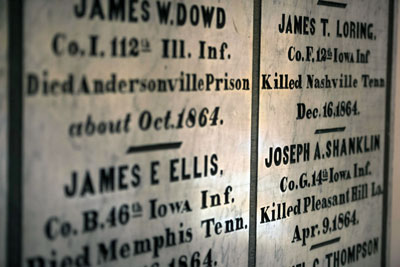 Regarding the item in the summer edition of The Grinnell Magazine about a memorial honoring our deceased veterans of all wars since the Civil War [Page 5], this is clearly an entirely worthy and important project.
Regarding the item in the summer edition of The Grinnell Magazine about a memorial honoring our deceased veterans of all wars since the Civil War [Page 5], this is clearly an entirely worthy and important project.
Reading about it, however, raised a question in my mind. Is there ever a thought or recognition of those Grinnell men and women who fought those wars, who were in most cases forced by the draft to leave college, enter service and spend precious and dangerous years in far-off places?
I entered Grinnell in the fall of 1941 as a freshman at the age of 17. Two weeks after I turned 18, Pearl Harbor was attacked. By the end of the following school year, the College was almost emptied of male students and drained also of a significant number of female students.
Most of us in service spent the next three years or so in faraway places, out of touch with families and loved ones, except for censored mail stripped of any mention of our location or activities. At least for those serving in the Pacific theatre, there was virtually no leave, no R and R, and little expectation of going home until the war came to an end, estimated to be years away.
Grinnellians were certainly represented in those remote places. I accidentally ran into three people from Grinnell in those years overseas, one in New Guinea and two in the Philippine Islands. I did not know them well, but running into someone from college was almost like running into one's own brother. Acquainted or not, we had a perfectly wonderful hour or two.
At age 21 or 22, I commanded a 160-ton ship manned by a crew of 14 (ages 19 to 33) and one other officer. What an experience for an Iowa boy who had only seen salt water just once in his life. It was dangerous. We lost one of our crew at Leyte Gulf, a nice young man from Norwalk, Connecticut — the worst day of my life, so far.
However, on the plus side, the experience enabled me to go to law school on the GI Bill, something that would have never been feasible otherwise, mostly for financial reasons. A rewarding career followed — 38 years of law practice and 12 as a judge. A good enough trade-off, as it turned out.
